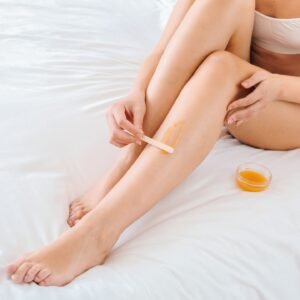Can You Get Sugared While Pregnant?

Pregnancy brings many changes to a woman’s body and with it a long list of things to consider when it comes to self-care and beauty routines. One of the most common questions asked is “Can you get sugared while pregnant?” The answer is generally yes, sugaring is considered safe during pregnancy, but there are several factors to consider to ensure a safe and comfortable experience. In this article, we’ll look at whether sugaring is safe during pregnancy, what you should be aware of, what to expect during a sugaring session and how to maintain smooth, healthy skin after the treatment.
Table of Contents
- Is Sugaring Safe During Pregnancy?
- Considerations When Getting Sugared While Pregnant
- What to Expect During a Sugaring Session
- Post-Treatment Care
- Frequently Asked Questions
- Is it safe to get sugared while pregnant?
- Does pregnancy make sugaring more painful?
- What precautions should I take before getting sugared during pregnancy?
- What should I do after a sugaring session while pregnant?
- Can I get sugared in the later stages of pregnancy?
Is Sugaring Safe During Pregnancy?
The first question many expectant mothers ask is “Can you get sugared while pregnant?” Sugaring is a hair removal method that uses a paste of sugar, lemon and water to remove hair from the root, and it’s generally considered safe for most women. However, pregnancy causes changes in skin sensitivity. Due to hormonal fluctuations, you may find that your skin becomes more sensitive, more prone to irritation or even more prone to bruising. Although sugaring is usually gentle, the increased sensitivity of the skin during pregnancy can make the process a little more painful. For this reason, it’s always a good idea to consult your doctor before making an appointment for a sugaring session.
Considerations When Getting Sugared While Pregnant
Hormonal Changes: Pregnancy hormones can make your skin more sensitive and alter the texture of your hair. Some women experience thicker or coarser hair during pregnancy, which can make sugaring more uncomfortable. It’s also common for increased blood circulation to heighten sensitivity, which may lead to more pain during the procedure.
Skin Sensitivity: As mentioned, hormonal changes can lead to more sensitive skin. If you’re prone to skin conditions like acne or eczema, you may want to postpone sugaring or consult with a dermatologist to ensure it’s the right choice for you.
Timing: Later in pregnancy, it may be uncomfortable to lie on your back for an extended period, which could make the procedure more difficult. Discuss your needs with your technician to ensure you’re comfortable during the session.
Quality of Products: Make sure the salon you choose uses high-quality, hypoallergenic products. Pregnancy can increase your susceptibility to allergic reactions, so it’s worth asking about the ingredients in the sugaring paste.
What to Expect During a Sugaring Session
If you decide to go ahead with sugaring, it’s helpful to know what to expect. Sugaring is often described as a gentler hair removal technique compared to waxing, but it still involves removing hair from the root. Here’s what typically happens:
Preparation: The area will be cleaned to remove any oils or dirt. Some salons may recommend exfoliating beforehand, but if your skin is sensitive, it’s best to skip this step.
Application: The sugaring paste will be applied to the skin in the opposite direction of hair growth. The technician will then press a cloth strip on top of the paste and quickly pull it in the direction of hair growth to remove the hair.
Pain Level: While many women find sugaring to be less painful than waxing, it can still cause discomfort, especially during pregnancy due to heightened skin sensitivity. The technician will work quickly to minimize discomfort, but be prepared for some stinging sensations.
Duration: A typical session lasts from 15 to 45 minutes, depending on the area being treated. If you’re further along in your pregnancy, be sure to communicate if you need breaks.
Try our sugaring PRO Set:
Post-Treatment Care
After sugaring, proper post-treatment care is important to prevent irritation and maintain smooth skin:
Avoid Sun Exposure: Your skin will be more sensitive, so avoid direct sun exposure for 24-48 hours to prevent burning or irritation.
Moisturize: Apply a gentle, fragrance-free moisturizer to soothe the skin and keep it hydrated.
Avoid Tight Clothing: After sugaring, avoid tight clothes on the treated area to reduce friction and irritation. Opt for loose, comfortable clothing.
Exfoliate: Once the initial irritation subsides, gently exfoliate the treated area to prevent ingrown hairs. Avoid scrubbing too harshly, as this can irritate sensitive skin.
So, can you get sugared while pregnant? Yes, it is generally safe, but it’s important to take your skin’s sensitivity and your comfort level into account. Be sure to consult your doctor, choose a reputable salon, and communicate with your technician about your specific needs. With the right care before, during, and after the procedure, you can enjoy smooth, healthy skin throughout your pregnancy.
Frequently Asked Questions
Is it safe to get sugared while pregnant?
Yes, sugaring is generally safe during pregnancy. However, due to increased skin sensitivity caused by hormonal changes, it is advisable to consult your doctor before booking a session.
Does pregnancy make sugaring more painful?
Pregnancy can increase skin sensitivity and circulation, making sugaring slightly more uncomfortable for some women. Choosing an experienced technician can help minimize discomfort.
What precautions should I take before getting sugared during pregnancy?
Ensure the salon uses high-quality, hypoallergenic products, and inform your technician about your pregnancy so they can adjust the procedure for your comfort.
What should I do after a sugaring session while pregnant?
Avoid sun exposure, wear loose clothing, and moisturize with a gentle, fragrance-free product. After irritation subsides, gently exfoliate to prevent ingrown hairs.
Can I get sugared in the later stages of pregnancy?
Yes, but lying on your back for extended periods may be uncomfortable. Discuss your needs with your technician to ensure a safe and comfortable experience.










